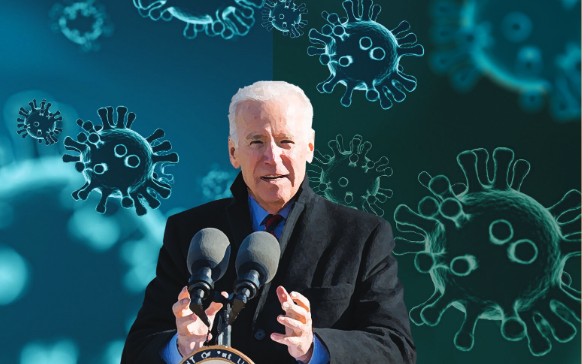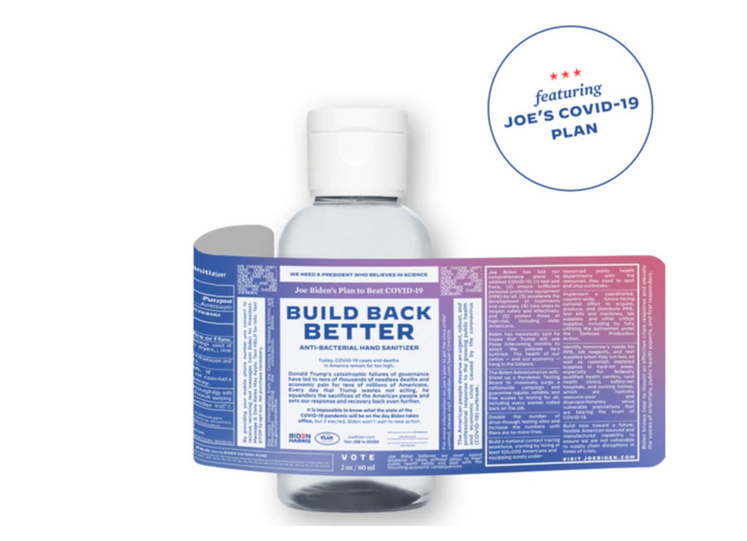
The Biden-Harris administration’s new COVID-19 Advisory Board promises to bring a strong public health perspective to the nation’s pandemic response and a welcome shift away from the haphazard, willfully anti-scientific policies of the Trump administration.
But it could be a thorn in the paw for the dietary supplement industry and for some practitioners of natural medicine.
The 13-member brain trust–announced just days after Biden was declared winner of the fiercely contested election–will be led by a trio of physicians: Vivek Murthy, MD, the former Surgeon General under President Obama; Marcella Nunez-Smith, MD, a professor of medicine and epidemiology at Yale School of Medicine; and David Kessler, MD, the FDA commissioner from 1990-1997 under Bush and Clinton.
Among the board members are:
- Atul Gawande, MD, MPH, professor of surgery at Brigham & Women’s Hospital, and chairman of the board at Haven Health, a healthcare joint venture between Amazon, Berkshire Hathaway, and JP Morgan Chase;
- Oncologist Ezekiel Emanuel, MD, PhD, chair of the department of Medical Ethics & Health Policy at University of Pennsylvania and former advisor to Obama’s Office of Management and Budget;
- Immunologist Rick Bright, PhD, former head of the Biomedical Advanced Research and Development Authority (BARDA) under Trump, who was demoted to a lower position at the National Institutes of Health after repeated clashes with the President and with Health and Human Services secretary, Alex Azar.
The three co-chairs—Murthy, Nunez-Smith, and Kessler– all have strong clinical as well as public health backgrounds, and will likely bring a measured, data-driven influence into the new administration’s efforts to contain the pandemic.
Outspoken Supplement Foe
But Kessler is a longstanding and outspoken critic of the dietary supplement industry, going back to his FDA tenure, during which the Clinton administration passed the Dietary Supplement Health and Education Act (DSHEA) of 1994.
DSHEA, which had bipartisan support back in 1994, created ground rules for “structure/function” claims in the marketing of supplements, and established the legal framework—or lack thereof—for the industry.
Kessler openly detested the bill, and strongly objected to its passage, claiming it restricted the FDA from fulfilling its mission to protect the public from fraudulent and dangerous products. Many have disputed his views over the ensuing years, but they’ve done little to change his mind.
Some within the holistic and functional medicine fields are concerned that Kessler’s influence on the Biden-Harris task will bring a strong anti-supplement bias to the administration’s COVID-19 strategies.
That would be unfortunate, given the burgeoning evidence suggesting that vitamin D deficiency may be a risk factor for COVID, and that supplementation might play a role in boosting immunity, enhancing overall health, and reducing some of the cardiometabolic risk factors associated with worse COVID outcomes.
Neither Kessler nor the other advisors have direct policy-making power. But his categorically negative attitude toward supplements could reinforce a view that vaccines and pharmaceuticals are the only legitimate solutions, and that there is no reason to consider interventions for bolstering resilience and overall health.
Disdain for DSHEA
Dr. Kessler is a pediatrician by training, but also holds a law degree.

His public service began in the mid-1980s, when he was a consultant to Republican senator Orrin Hatch from Utah, working on issues like food additive safety and tobacco regulation. At the time, he was simultaneously administering a large teaching hospital in New York City, while also teaching law at Columbia University.
He was appointed to head the FDA by George H.W. Bush in 1990. Despite his GOP pedigree, Kessler won allies among congressional Democrats for his efforts to fast-track the approval of HIV/AIDS drugs, his push for Nutrition Facts labels on foods, his aggressive stance against the cigarette industry, and his insistence that FDA be more active in policing fraudulent food claims.
Passage of DSHEA drew Kessler into open conflict with Senator Hatch, his former mentor. Hatch, representing the state of Utah—a supplement industry stronghold—was the main sponsor of the law, along with Iowa Senator Tom Harkin.
Dr. Kessler’s disdain for DSHEA has not diminished over the years. In an editorial in the June 8 2000 edition of the New England Journal of Medicine, he wrote, “Congress has shown little interest in protecting consumers from the hazards of dietary supplements, let alone from the fraudulent claims that are made. Nor does the public understand how potentially dangerous these products can be.” He went on to say that DSHEA leaves the supplement industry largely unregulated, and urged congress to revise the law.
In 2016 Kessler was among six ex-FDA commissioners convened by The Atlantic magazine at the Aspen Institute, to discuss the impact of DSHEA. Not surprisingly, his remarks focused on its flaws.
Kessler stepped down from the FDA in 1997, taking a position as dean of Yale School of Medicine. He subsequently moved to UCSF Medical School where he was dean and vice-chancellor. During his 4 years there, he discovered budgetary irregularities that contradicted the University’s official financial records. Kessler clashed with UCSF’s then-chancellor, J. Michael Bishop, who claimed there was no accounting malfeasance and demanded Kessler’s resignation.
A subsequent independent audit by KPMG vindicated Dr. Kessler.
In 2009, Dr. Kessler published The End of Overeating, a consumer-focused book exploring the ways in which fat, salt, and sugar modulate brain chemistry, and how the food and restaurant industries contribute to the pandemic of obesity by intentionally manipulating this physiological circuitry to promote overeating.
As of this writing, none of the new COVID advisors have made any public statements, and it is unknown whether other board members share Kessler’s views on supplements.
Neither Joe Biden nor VP Kamala Harris have expressed any specific views on supplements, and neither have been involved in legislation directly affecting the supplement industry or the practice of holistic medicine.
Emphasis on Vaccines
There’s no doubt vaccines will be central to the Biden-Harris COVID response, and that the administration will move quickly to develop and deploy them.

“Effective, equitable distribution of treatments and vaccines” is a key piece of Biden’s “Seven Point Plan” to mitigate COVID-19.
In addition to continued support for vaccine research, the plan would put $25 billion into manufacture and distribution. Biden promises to put scientists, not politicians, in charge of decisions on safety and efficacy, and to make all vaccine data available to the public.
Vaccine-makers have already gotten a pass on pre-approval site inspections from the Trump administration.
Under normal circumstances, prior to final approval, FDA inspectors visit drug or vaccine manufacturing plants to ensure full compliance with quality control guidelines. This is time-consuming, and can delay approval and release by months or even years.
The emergency-use authorizations currently in place for new COVID-19 vaccines waive this requirement for pre-approval inspections.
The move has caused consternation not only for vaccine critics within the holistic and functional medicine world, but also among leaders in the pharmaceutical and biotech industries.
“The dangers of unregulated COVID-19 drugs and vaccines are clear and present. Normal circumstances require years for a vaccine to be produced. I know pandemic fatigue is setting in for many. Many hope for a vaccine to stop the disease instantly. They will be sadly disappointed,” writes William Haseltine, PhD, a pioneer in the field of genome-based drug development, in a recent Forbes editorial.
“Even if a vaccine is approved early next year, and even if it is safe and effective, the hoped-for relief will be months in coming. People may forgive the failure of a vaccine because of the intense difficulty of preventing COVID-19 infections. They will not forgive a vaccine that endangers their life because of manufacturing errors.”
Biden’s Seven Point Plan
Beyond vaccine deployment, the other six elements in the Biden-Harris plan are:
- Ensure all Americans have access to regular, reliable, and free testing: The administration wants to double the number of drive-through test sites, ramp up home testing, and create a public health jobs corps for testing and contact tracing.
- Fix personal protective equipment (PPE) problems for good: By invoking the Defense Production Act, Biden intends to increase domestic production of masks, shields, gloves and other PPE, and reduce reliance on overseas manufacturers.

- Provide clear, consistent, evidence-based guidance for how communities should navigate the pandemic – and the resources for schools, small businesses, and families to make it through: This includes funds to ensure state and local governments hard-hit by the pandemic can continue to pay teachers, medical workers, first responders and other civil servants, as well as small business “restart packages” to defray the costs of PPE and socially-distanced production facilities.
- Protect older Americans and others at high risk, including creation of a Racial and Ethnic Disparities Task Force.
- Rebuild and expand defenses to predict, prevent, and mitigate pandemic threats, including those coming from China: This includes immediate re-establishment of the White House National Security Council Directorate for Global Health Security and Biodefense, initially established by Obama and dismantled by the Trump administration; rejoining the World Health Organization, and increasing the number of CDC “disease detectives” in China and other known sources of zoonotic pathogens.
- Implement mask mandates nationwide: The Biden administration plans to work with governors and mayors to increase compliance with recommendations that people wear masks whenever they are out in public.
While few would argue against the virtues of increasing PPE production, improving access to tests, or stepping up efforts to protect the elderly, many aspects of the Biden plan—the vaccine initiative, mask mandates, re-joining the WHO, contact tracing—will undoubtedly meet extreme political and public resistance.
The degree to which the new administration will be able to actualize any of its plans depends, in part, on which party—and by extension, which voting block—controls the Senate. That will be decided by outcomes of the runoff elections in Georgia on January 5.
END







